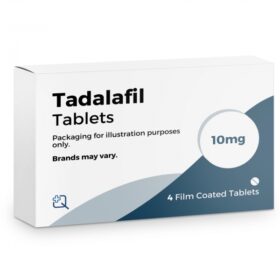- Your cart is empty
- Continue Shopping

Product
Ritalin
Ritalin is a prescription medication that contains the active ingredient methylphenidate. It belongs to a class of drugs known as central nervous system stimulants and is primarily used for the treatment of attention deficit hyperactivity disorder (ADHD) and narcolepsy. Here are some key details about Ritalin:
Mechanism of Action: It works by increasing the levels of certain neurotransmitters, such as dopamine and norepinephrine, in the brain. These neurotransmitters play a role in regulating attention, focus, and impulse control, which are areas of difficulty for individuals with ADHD.
Medical Uses: Ritalin is primarily prescribed to manage the symptoms of ADHD in children, adolescents, and adults. It helps improve attention span, decrease impulsiveness, and control hyperactivity. The drug may also be used to treat narcolepsy, a sleep disorder characterized by excessive daytime sleepiness and sudden episodes of sleep.
Dosage Forms: Ritalin is available in immediate-release tablets and extended-release capsules. The immediate-release formulation provides a rapid onset of effects but has a shorter duration of action, typically lasting 3-4 hours. The extended-release formulation, such as Ritalin LA or Concerta, provides a more gradual release of the medication over an extended period, offering effects for 8-12 hours.
Dosage and Administration: The dosage of Ritalin is individualized based on various factors, including age, weight, and the specific needs of the person being treated. The medication is typically taken orally once or twice a day, with or without food, as directed by the prescribing healthcare professional.
Effects and Benefits: The drug helps improve focus, attention, and impulse control in individuals with ADHD. It may enhance cognitive abilities, increase alertness, and reduce hyperactivity and restlessness. By managing these symptoms, this drug can help individuals with ADHD improve their ability to concentrate and engage in daily activities.
Side Effects: Common side effects of Ritalin may include decreased appetite, weight loss, insomnia, headache, irritability, and nervousness. Some individuals may experience more severe side effects, such as mood changes, increased heart rate, elevated blood pressure, or allergic reactions. It is important to report any concerning or persistent side effects to a healthcare professional.
Precautions and Contraindications: Ritalin is contraindicated in individuals with a history of cardiovascular disease, hypertension, hyperthyroidism, glaucoma, or a known hypersensitivity to stimulant medications. It should be used with caution in individuals with a history of substance abuse or mental health disorders. It may interact with other medications, so it is important to inform the prescribing healthcare provider about all current medications and medical conditions.

Potential for Abuse: Ritalin, like other stimulant medications, has a potential for abuse and can lead to dependence or addiction. It is classified as a Schedule II controlled substance in the United States due to its potential for misuse. Therefore, it should be used exactly as prescribed and not shared with others.
Chemical Composition: The drug contains the active ingredient methylphenidate hydrochloride. It is chemically similar to amphetamines and produces stimulant effects on the central nervous system.
Dosage Adjustments: The dosage of Ritalin is typically started at a low level and adjusted based on the individual’s response and tolerance. The goal is to find the lowest effective dose that alleviates symptoms while minimizing side effects. Regular communication with the prescribing healthcare professional is important for dosage adjustments.
Duration of Effects: The immediate-release formulation of this drug typically provides effects for a few hours, while the extended-release formulations, such as Ritalin LA or Concerta, can provide effects for a longer duration, usually up to 12 hours. The duration may vary depending on the specific formulation and individual response.
Administration Guidelines: Ritalin is usually taken orally with or without food. The extended-release formulations should be swallowed whole and not crushed, chewed, or dissolved. The medication should be taken at the same time(s) each day as prescribed.
Treatment Monitoring: Regular monitoring is important during Ritalin treatment. Healthcare professionals may periodically assess the effectiveness of the medication, monitor for side effects, and adjust the dosage as needed. They may also evaluate the need for continued treatment over time.
Non-Stimulant Alternatives: In cases where individuals do not tolerate or respond well to stimulant medications like Ritalin, non-stimulant medications such as atomoxetine or certain antidepressants may be considered as alternative treatment options for ADHD.
Withdrawal and Discontinuation: If Ritalin treatment is stopped after prolonged use, some individuals may experience withdrawal symptoms such as fatigue, depression, and increased appetite. Gradual tapering of the medication, under the guidance of a healthcare professional, can help minimize these effects.

Educational Support and Counseling: Along with medication, individuals with ADHD often benefit from behavioral therapy, educational support, and counseling. These interventions can help individuals develop coping strategies, improve organizational skills, and address any emotional or social challenges associated with ADHD.
Additional Information
| Quantity | 25 tabs, 50 tabs, 100 tabs |
|---|








